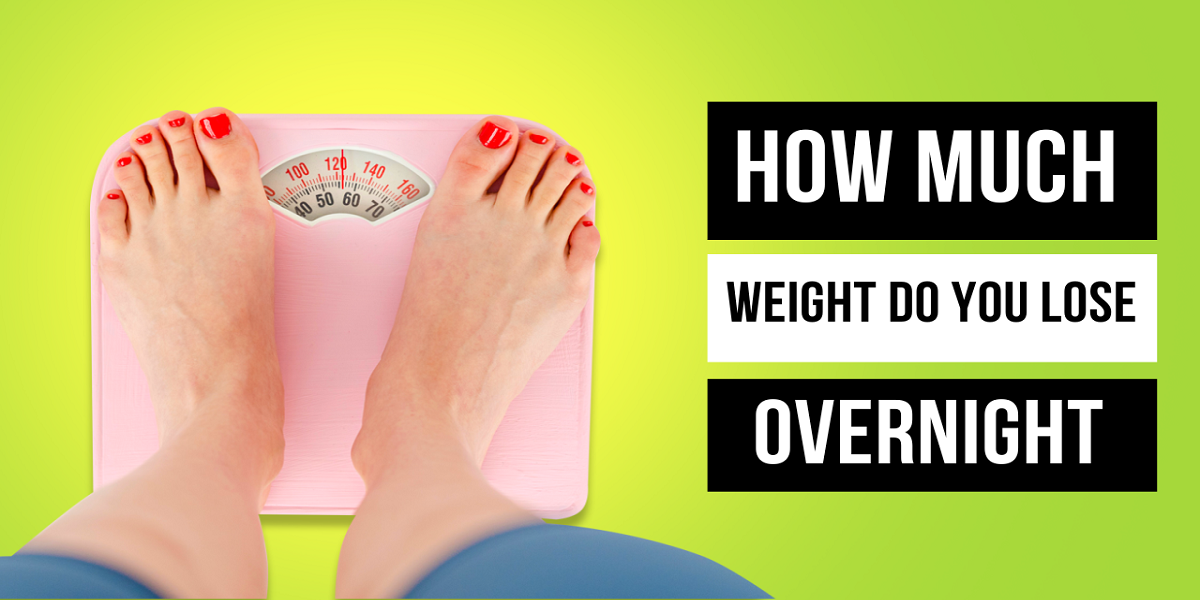How Much Weight Do You Lose Overnight On Average – What Studies Reveal 2024

If you ever happened to weigh yourself in the morning, you might have noticed that your weight is lesser than what it is throughout the day.
The body weight can shift significantly during the day because of what you eat or drink, your lifestyle, or rather, how active you are. The metabolic rate of your body also influences the fluctuation in numbers. That is why, many dieticians or gym trainers suggest that you check your weight around the same time every day, which is usually in the morning hours. The reason is- people tend to lose a good amount of weight overnight when they are inactive!
A good sleep routine and the quality of sleep have a lot to do with shedding that extra fat from the body overnight. Good sleep leads to the healthy functioning of all the systems in the body, removes toxins, improves metabolism, and thus contributes to weight reduction.
In this article, you will learn about how much weight you lose overnight on average, why and how does the body shed weight when you are asleep, and how to incorporate good sleeping habits for long-term weight management.
How Much Weight Do You Lose Overnight On Average
The body loses a lot of calories in the night when you are asleep. The main reason is that, when you are in an inactive state, your vital organs like the brain, heart, lungs, etc. need more energy to function. Higher energy means more calorie usage. Therefore, when in sleep, you can, on average, lose up to 3 to 4 pounds. You can see this change when you stand on the weighing scale first thing in the morning.
However, remember that this weight reduction is temporary and for you to burn the body fat significantly for long-term weight management, you will have to follow a healthy, low-calorie diet, get proper sleep, and a regular workout routine.
The weight doesn’t stay in one place throughout the day. Even one good meal during the day can tip the numbers forward when you stand on the scale. Even if you just gulp down a couple of glasses of water or fresh juice, you will notice a change in your weight. If you are one of them maintaining a log book, then it is probably best to stay away from the weighing machine after a meal if you do not want to get disheartened.
Now let’s understand what causes weight loss overnight.
Reasons You Lose Weight Overnight
It may be confusing to understand how you lose weight at night because when you are asleep, your body’s metabolic process decreases. The digestion thus slows down yet you shed a few pounds! This is how-
Losing Water Weight

Whenever the body retains extra water inside and causes the weight to tip forward a bit, then that is the ‘water weight’. (It is important to note that we are not talking about chronic water retention because of kidney problems or other health issues). Now, on average, the body of an adult person has about 55% to 60% water, which accounts for a significant portion of the weight. We tend to lose the extra water overnight contributing to weight loss through:
● Sweating
● Urination Process
Through Sweating:
People tend to sweat in the night while they are asleep. On average, if the temperature is around 85°F, the body releases around 200 ml of sweat on 7 to 8 hours of sleep. However, this can vary depending on the temperature of the room. If the days are more hot and humid, it can lead to sweating. This leads to losing a good amount of water from the body and in return you lose the water weight.
Aside from that, during work out, you sweat as your body produces heat and on days of intense workouts, the sweating may be more during the night when you sleep. Sweating also depends on your body’s natural temperature, ability to produce sweat, and the food you eat throughout the day, especially the night before sleeping.
For example, some people who eat a lot of spicy food may tend to sweat more than others. The reason is spices like cayenne pepper, or black pepper can lead to thermogenesis and increase the metabolism. When you sleep, the body uses the water inside to cool down by sweating. Many people may also have a naturally heated body and tend to produce more sweat waking up some pounds lighter.
Sweating at night can also be the result of various health conditions like hypertension, blood pressure, or the side effects of some medications, etc.
Through Urination
When the body breaks down the food and drinks we consume throughout the day, it may lead to urinating. This leads to losing a certain portion of water from the body. Many people get the urge to urinate in the middle of the night. Various factors influence the rate of urination in the night like age, health condition, weight of the body, and what you eat and drink during the day. When you advance in age, the body tends to produce more urine. Because the body does not absorb this, it needs to be out which contributes to weight loss overnight.
Carbon Loss
The normal level of carbon dioxide present in the blood of an adult is about 23 to 30 mEq/L which makes up about 21 pounds in an average adult body. When you breathe, the body takes in oxygen and exhales carbon dioxide as a part of the natural process.
As you exhale every time, a few molecules of the carbon escape along with one extra oxygen atom. While this may seem extremely negligible, you breathe in and out hundreds of times in the night releasing carbon dioxide which accounts for a significant amount of carbon loss. This in turn supports the weight loss process overnight.
Various Health Conditions
There are certain health conditions that can cause you to lose weight rapidly. For example, Hyperthyroidism is a condition caused by a hyperactive thyroid gland. In this, the body produces excessive levels of thyroxine and triiodothyronine hormones. These hormones are important for proper metabolism in the body but high production can adversely affect weight loss, palpitation, etc. People suffering from this may suddenly notice a significant dip in their body weight overnight.
Some of the common symptoms include increased heart rate, drastic weight loss, change in the body’s metabolism, increased appetite, and excessive sweating among others. Do not hesitate to visit a doctor and get yourself tested in case you experience any of these.
Importance Of Sleep Quality And Sleep Duration In Weight Loss

When aiming to lose weight, two main areas that most people focus on are workout and diet. But what many people often ignore is sleep. Weight Loss has a direct correlation with your sleeping quality. Lack of sleep or poor sleeping habits can result in significant weight gain or even difficulty in shedding pounds.
An adult should, on average, sleep 7 hours or more every night in order to maintain good health. This, in turn, will assist in proper weight management. A study has shown that a shortage of sleep, or people who sleep for 5 hours or less have higher chances of suffering from type 2 diabetes, heart issues, and obesity.
When you are sleep deprived, the various hormones in your body start acting differently thus causing an imbalance. Hormones like ghrelin and leptin, which are responsible for regulating the appetite increase the food cravings if you do not sleep well, and you start eating more. In addition to that, irregular sleeping habits make you inactive and reduce your physical activity throughout the day. This in turn affects the metabolism, causes fatigue, and an unbalanced diet leading to weight gain.
That is why, if you are trying to lose weight then one of the important things that you must consider is following a good sleep routine.
How To Improve Sleep Routine To Support Long-Term Weight Loss

Here are a few things that you can do to improve the quality of your sleep as a part of weight loss management:
Make a schedule and follow it: Oftentimes, sleep deprivation can be the result of an improper sleep schedule. That is why it is extremely important to make a schedule of your sleep and stick to it. You need to monitor your sleep and your daily tasks and create a balance between the two.
Ensuring that you complete your everyday work during the day so you can stick to your sleeping time will help you improve your sleep quality. Going to sleep at the same time regularly (preferably early), and sleeping for 7 hours or more is a key to losing weight.
Turn the lights off: Creating a bedtime ambiance will help in improving the quality of sleep. So when you go to sleep, make sure to turn the light off or dim them so it doesn’t cause a distraction to your body and mind. The Melatonin hormone in the body is responsible for the sleeping cycle and is sensitive to light. The light coming from LEDs, the sun, and various other sources can, therefore, affect melatonin functioning leading to disturbance when you are sleeping.
Switching off the lights also includes the lights from electronic gadgets like mobiles and laptops. The blue light coming from these electronics hinders sleep quality in a big way which is why it is best to turn off all these devices before going to bed.
Relax your mind: You cannot sleep well unless your mind is clear of thoughts and stress. So including some relaxation techniques like drinking camomile tea, listening to a podcast, music, meditation, or sleep-related breathing exercises prove to be effective in calming down the mind. This then offers a good sleep aside from making it much easier to fall asleep.
Keep your body and the surroundings cool: Your body’s temperature and most importantly the temperature of the room you sleep plays a crucial role in how well you sleep. Drinking water before bed and eating soothing food at night can keep your body cool. As for the room’s temperature, keeping it cool on a warm day can prevent sweating and restlessness and help you sleep better.
Studies show that the ideal temperature for sleeping tight at night is around 65 to 70 degrees Fahrenheit, although this can vary slightly from person to person.
Conclusion
The bottom line is, your body can lose some weight through the night when you are asleep. You tend to shed up to 3 or 4 pounds of weight as a part of water weight (through urination and sweat), and carbon loss when you breathe.
However, it is very important to understand that long-term weight loss is directly linked with good sleeping habits and this can be done by following a routine and a healthy lifestyle. In addition to that, if you want to maintain consistency in your weight, you will have to exercise on a regular basis and follow a healthy and low-calorie diet.
Frequently Asked Questions (FAQs)
How much weight can I lose overnight?
While it depends from person to person as to how much weight is shed in the night, on average, you may lose up to 4 pounds while sleeping.
Which is the best time for weighing yourself?
The best time to consult your weighing machine is in the morning. This is the time you will get an accurate number because your body has shed a few pounds overnight, undergone digestion, and has a clean system before you start your day again.
How can I lose weight easily?
Losing weight can be challenging but following a disciplined schedule with a strict, low-calorie diet and regular exercise, can make your weight loss journey easier. Some people who struggle with losing weight may also consider taking weight loss supplements to pace up the process.
Is there a relationship between weight and sleep?
Sleep and body weight definitely go hand in hand. As mentioned in the article above, lack of sleep or low-quality sleep can lead to a significant gain in weight. If you have a goal of losing weight long-term, then increasing the quality of sleep will make a huge difference.
